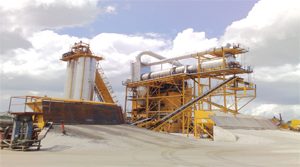The government should incentivise the use of reclaimed asphalt pavement.
Ashok Tanna Managing Director Linnhoff India. We are upgrading our plants to incorporate the use of waste recycled plastic. Linnhoff India is a leading manufacturer of high quality, efficient and innovative products such as asphalt

 Ashok Tanna
Ashok Tanna
Managing Director
Linnhoff India.
We are upgrading our plants to incorporate the use of waste recycled plastic.
Linnhoff India is a leading manufacturer of high quality, efficient and innovative products such as asphalt plants and concrete batch mix plants in India. “We are soon coming out with our expandable version of plants which will eliminate the client having to buy new plants but instead can simply upgrade them,” states Ashok Tanna, Managing Director, Linnhoff India. Tanna shares his views on the technology trends in asphalt plants and use of RAP and plastics in road construction.
What are the key market trends in asphalt plants in terms current and expected demand from NHAI and State Highway and Rural road projects? What capacity plants are in demand for these projects?
 The Indian road sector has entered the fast lane, with the highest ever kilometres being awarded last fiscal. The pace of construction, too is cruising having doubled to 27km per day currently, and expected to touch 40 km per day by fiscal 2020.The market has evolved to a great extent. The largest demand in this segment is in the range of 120 to 160 tonne per hour plants. The demand of higher capacity plants has risen due to large size projects which are awarded through hybrid annuity mode. However, some of the larger contractors are viewing RAP usage as a mainstay and installing higher capacity plants with the latest technologies.
The Indian road sector has entered the fast lane, with the highest ever kilometres being awarded last fiscal. The pace of construction, too is cruising having doubled to 27km per day currently, and expected to touch 40 km per day by fiscal 2020.The market has evolved to a great extent. The largest demand in this segment is in the range of 120 to 160 tonne per hour plants. The demand of higher capacity plants has risen due to large size projects which are awarded through hybrid annuity mode. However, some of the larger contractors are viewing RAP usage as a mainstay and installing higher capacity plants with the latest technologies.
To what extent your range of asphalt plants has taken advantage of telematics and data-driven technologies?
We moved to SCADA a long time ago which shows Visual Representation, Trend Representation and Alarm Management. These features generate useful data which can be analyzed and hence can improve the efficiency of the plant by taking necessary actions. Currently the market is quite nascent and needs further education on the benefit of use of data and telematics. We are taking up the role through our own development wherein subscribed clients of our equipment users receive a monthly report on the equipment performance with its data.
Could you also brief us on the software used in your plants, its main features and advantages?
Our current software/s is intelligent and comes from a process of continued upgradation and have capabilities of remote monitoring and diagnostics. Our Software Asphalt Pro® has many features. Salient among these are
- Windows based
- Clear visualization in real time of the complete plant on the monitor
- Real time on line diagnostics
- Remote monitoring and operation
- Fully automated run process
- Up to 1000 mix design storage
- Expandable hardware to incorporate warm mix, rap, mastic, SMA and plastic, dual fuels amongst others.
It doesn’t matter whether the technology used is batch / continuous; inefficiencies can only pull the profitability down? What is your take on this with regard to Indian context?
This is an incorrect perception. Technology only enhances performance. Teams work hard to complete the research and it brings out evolution. This evolution increases plant outputs and efficiencies. The lack of user knowledge and the lack of implementation / impartation of knowledge correctly by OEM can only be deficiencies to achieve a better result.
What are the new technical features in your latest plants? How do these new technologies contribute to higher productivity and profitability?
We have put our products on the forefront of continuous evolvements. The current plants are demanded with use of recycling plastic waste in pellet form. We have been at the forefront of adapting the plant for use of these products. We have also been very ahead in providing plants for use with SMA to increase the mix quality. Our dual fuel coal cum oil burners DustPro® have found quick market acceptance and saves considerable fuel costs. Our pellet burners B Max® have seen great success that uses any type of waste for use of the bitumen heating process. We believe our teams continued R&D will keep us pushed forward for the future market trends.
What are the significant changes in the plant configuration, asphalt production process and fuel systems? What are their key advantages in terms of versatility and energy efficiency?
As stated earlier the use of plastic waste saves bitumen; coal cum oil burners saves fuel costs to the tune of 30%; pellet burners reduces bitumen heating costs to 1/5th of current costs; and warm mix provides a reduction of 3-5% in production costs due to reduction in laying temperature of asphalt.
What are the advantages and scope for low energy /low temperature asphalt mix in the Indian scenario?
In India the market for low energy asphalt mix is quite nascent and there is a lot of education involved. Corporates are quick to adapt to newer technologies. The product is good more for the northern part of India where in winter the application of low energy asphalt shall play a great benefit. Anything that saves energy is a product that will find demand as it brings the cost of asphalt down.
Some of the benefits include
Enables increased use of RAP – without super-heating of the virgin aggregate offering up to 50% savings in energy and carbon Rapid stability of laid and compacted pavement for early trafficking – the surface can be trafficked earlier than standard hot-mix asphalt reducing the time for road closures.
Improved safety characteristics – lower temperatures and significantly reduced fuming compared to hot-mix asphalt.
Reduced application temperatures – it means improved health and safety for laying crew and general public Reduced binder ageing compared to hot-mix asphalt.
What is the present scenario of using recycled aggregates and asphalt for road construction? What needs to be done to promote its use in order to preserve virgin resources?
The government has made good progress by allowing the use of Rap upto 30% in mix design. This saves the environment and also precious costs of bitumen. The government should push further into allowing use of RAP upto 70% in mix design wherein the pavement is usable. This will bring a huge reduction in project costs and also work as a green initiative for a better environment. The government should also incentivise the use of RAP.
Could you enlighten us on the use of plastic in constructing roads and its advantages?
Most of the Indian roads have flexible pavements. This is largely because of low initial cost and easiness in its availability. But due to increased traffic and heavy repeated axle loads, the capability of bituminous binders is reduced resulting in rutting, potholes and cracks during cold climate; and bleeding during hot climate. Therefore it is essential to modify the bitumen in order to meet the requirements and to arrest the pavement failure.
Urbanization and rapid industrialization directly contributes to
environment degradation. The plastic waste which is non-biodegradable
gets mixed with solid waste and causes serious environmental impact. Thus an alternate use of waste plastic is
necessary. Softened plastic have a binding property and can be mixed with binder like bitumen to enhance the property. This is a good modifier
for the bitumen, used for road construction. Plastic can be widely used in pavement construction as it offers flexibility, strength between aggregates and bitumen. Concept of utilization of waste plastic in the construction of pavement has shown better resistance to water which reduces the stripping of bitumen from aggregate. The use of plastic thus contributes to construction of green roads. Therefore we are also upgrading our plants to incorporate the use of waste recycled plastic.
What is your assessment on growth opportunities by 2020? Also brief us on your road map?
India continues to evolve on a continuous basis and offers ample growth opportunity. We are soon coming out with our expandable version of plants which will eliminate the client having to buy new plants but instead can simply upgrade them. Our new designs have focused on installation of the latest technologies and have been kept simple in design. The smaller contractors need to invest only once and then continue to expand and evolve to adaptation of new technologies with ease. Our foray into concrete slipform paving equipment with Guntert and Zimmerman & Miller Formless are starting to pay rich dividends. We are the very first company in India to start the process of manufacturing slipform pavers locally and have overcome our initial hurdles on this path. Going forward we see the products adding substantially to both our top and bottom line sales revenue.
Hits: 65








